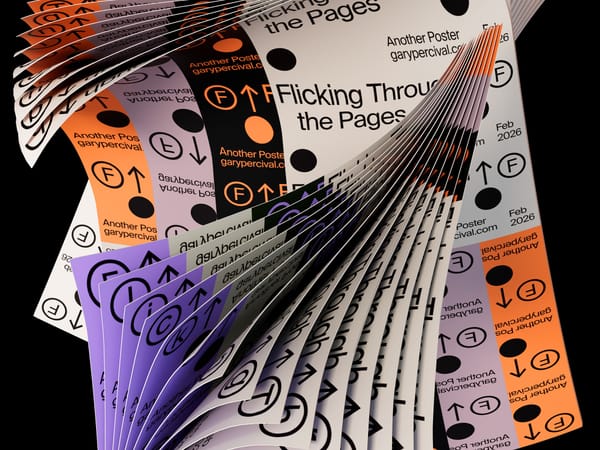Shifting Focus: Moving Towards the Next Big Thing
"The ability to adapt and evolve is one of the most valuable skills you can cultivate in the creative world."

As designers, freelancers, and creatives, we're constantly scanning the horizon to stay ahead of trends and maintain our edge in our ever-evolving industries.
But how do we recognise the right moment to realign our focus and embrace the next groundbreaking concept? And once we've identified it, what's the best way to pivot without alienating our current clients or sacrificing our artistic vision?
This post will delve into the nuanced art of refocusing in the creative realm, offering valuable insights and practical strategies to help you navigate change and position yourself for continued success in an increasingly dynamic landscape.
"The ability to adapt and evolve is one of the most valuable skills you can cultivate in the creative world."
Recognising the Need for Change
Before diving into how to shift focus, it's crucial to recognise when a change is necessary. Here are some signs that it might be time to start looking for the next big thing:
- Declining demand: If you notice a consistent decrease in demand for your current services or products, it may indicate a shifting market.
- Emerging technologies: New tools and technologies can quickly disrupt industries. Stay aware of innovations that could impact your field.
- Changing client needs: Pay attention to evolving client requests and pain points. These can signal new opportunities.
- Personal stagnation: If you feel creatively unfulfilled or unchallenged, it might be time to explore new directions.
- Industry buzz: Keep an ear to the ground for emerging trends and growing excitement around new concepts or techniques.
Identifying the Next Big Thing
Once you recognise the need for change, how do you identify where to focus next? Here are some strategies:
- Research and analyse trends: Study industry reports, attend conferences, and follow thought leaders to spot emerging trends.
- Network and collaborate: Engage with peers and professionals from adjacent fields to gain new perspectives and insights.
- Experiment with new techniques: Set aside time to explore new tools, mediums, or approaches in your work.
- Listen to clients: Pay attention to client feedback and requests, as they often reflect broader market needs.
"Sometimes, the next big thing comes from unexpected places. Draw inspiration from other fields and sectors."
Preparing for the Pivot
Before making a significant shift, it's essential to lay the groundwork for a successful transition:
- Skill development: Identify the skills you'll need for your new focus and start learning them. Online courses, workshops, and mentorship can all be valuable resources.
- Build a support network: Connect with others who are working in or transitioning to your new area of focus. Their insights and support can be invaluable.
- Create a transition plan: Outline the steps you'll need to take to shift your focus, including timelines and milestones.
- Secure your financial foundation: Ensure you have enough savings or steady income to support yourself during the transition period.
- Start small: Begin incorporating elements of your new focus into your current work to test the waters and build a portfolio.
Navigating the Transition
As you begin to shift your focus, keep these strategies in mind:
- Communicate with existing clients: Be transparent about your evolving focus. Some clients may be interested in your new offerings, while others may need help transitioning to new providers.
- Rebrand strategically: Update your portfolio, website, and marketing materials to reflect your new focus, but consider maintaining some connection to your previous work to ease the transition.
- Leverage your existing network: Your current contacts may be valuable resources for introductions, referrals, or even potential clients in your new focus area.
- Be patient: Building expertise and a reputation in a new area takes time. Set realistic expectations and celebrate small wins along the way.
- Stay flexible: Be prepared to adjust your approach as you learn more about your new focus area and receive feedback from clients and peers.
Maintaining Creative Integrity
One of the biggest challenges in shifting focus is maintaining your creative integrity while adapting to new demands. Here are some tips:
- Stay true to your values: Identify the core principles that drive your creative work and ensure they remain central to your new focus.
- Find the intersection: Look for ways to blend your existing strengths and unique perspective with the requirements of your new focus area.
- Set boundaries: Be clear about what types of work you will and won't do, even as you explore new territory.
- Continue personal projects: Maintain an outlet for pure creative expression alongside your commercial work.
"Strive to balance commercial success with artistic fulfilment in your new focus area."
Embracing Continuous Evolution
As you navigate your shift in focus, remember that change is a constant in the creative industry. Cultivating a mindset of continuous learning and adaptation will serve you well throughout your career. Here are some final tips for embracing ongoing evolution:
- Stay curious: Maintain a sense of wonder about new technologies, techniques, and ideas in your field and beyond.
- Allocate time for exploration: Regularly set aside time to experiment with new tools or approaches, even if they're not immediately applicable to your current work.
- Diversify your skills: Develop a range of complementary skills that can help you adapt to various opportunities and challenges.
- Build a learning network: Surround yourself with people who inspire and challenge you to grow and evolve.
- Reflect and reassess: Periodically review your career path, goals, and the state of your industry to ensure you're moving in a direction that aligns with both market demands and your personal aspirations.
Conclusion
Shifting focus towards the next big thing is both an exciting opportunity and a significant challenge for creatives, freelancers, and designers. By staying attuned to industry trends, preparing thoughtfully for transitions, and maintaining your creative integrity throughout the process, you can successfully navigate these pivotal moments in your career.
Remember that the ability to adapt and evolve is one of the most valuable skills you can cultivate in the creative world. Embrace change as a chance to grow, learn, and push the boundaries of your creativity.
As you move towards the next big thing, you're not just following a trend; you're actively shaping the future of your industry and your own creative journey.
So, keep your eyes open, your skills sharp, and your mind receptive to new possibilities. The next big thing might be just around the corner, waiting for you to bring it to life with your unique talents and perspective.



